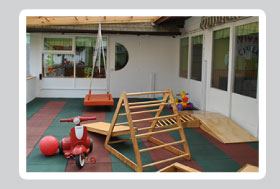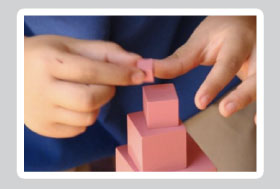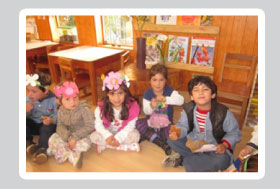

Pikler Loczy
We begin in our nursery school by implementing Loczy’s methodology, which references the importance of complete freedom of movement in infancy. Over 60 years ago, Dr. Emmi Pikler, Hungarian pediatrician and founder of the Pikler-Loczy institute in Hungary, worked to demonstrate the importance of an infant’s freedom of movement, and the idea of never placing the infant in a position that the infant has not elected of his or her own accord. Babies possess enormous potential in their spontaneous activity, concentration, insistence upon attaining self-determined objectives, flexibility and variety of movements, autonomy, and in the happiness produced by a feeling of accomplishment for having achieved a movement that has emerged from deep inside of themselves. However, the adult must provide adequate conditions in order for this spontaneous activity to emerge from within the infant. Namely, a safe area that is spacious enough for the infant to move around, respect for his or her individual development, and autonomy.


Montessori Method
This method indicates that human beings form the fundamental cerebral structures that underpin their future intellectual and emotional progress between the ages of 0 and 6 years old. In the Montessori educational model, development through learning is limitless. Children are permitted to learn everything when they want, wish, and need to, in a dynamic and entertaining way, and in a manner which is always fueled by one essential element—their own motivation to do so. The environment designed for this process maximizes each area of development: the sciences, math, language, art, motor skills, among others. At the same time, equally important in the foundation of a child’s education is learning to get along with others, social abilities, the development of self-esteem, organizational habits, perseverance, concentration, a love for work, autonomy, leadership, among many other skills.


Waldorf Method
The Waldorf Method is rooted in the research of Austrian scientist and thinker Rudolf Steiner, who points out that in the first years life, the development of the child is intimately tied to play. It is fundamental to activate a child’s imagination and fantasies through the use of songs, games, circle activities, and stories. Stories fulfill a very important role in the development of the imagination, creativity, and fantasy. In addition to achieving these skills, children also learn to develop their capacity to listen, as well as an interest in reading. All of this is accomplished in a warm, calm, and safe environment, where a feeling of security is achieved by using natural materials such as: wood, seeds, cotton, wool, stones, shells, cloth, etc, which allows the children to have their own experiences, and thereby awakening their interest and memory, as well as internalizing what they have learned.






